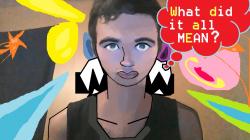Mother
Of course I don't love you,
What a question!
...
Well it's your own fault!
You wore a mask and
I loved the mask you pretended to be
...
I loved who I thought you were,
More than you'll ever know!
I loved you like
A little bird, blind and chirping for food
I loved you like a colt wobbling on tiny hooves
Nuzzling your flank
as you led me through the plains
I loved you like laughter
Laughter so bright and loud that
My stomach hurt and my cheeks were sore from smiling
I loved you like pictures in crayon
And you were drawn largest
Because you were the largest thing in my world
My gravity and my center,
And the most beautiful creature in God's earth
Nothing could compare, because nothing
Made me feel safer, more awed, more delighted
Of course I loved you!
Yet you were never there,
Just a mask that you wore
To make yourself safe from
Men and monsters and people who might see
Might see how small and desperate and angry you felt inside
And I, who would've loved you regardless,
Regardless of all the filth you hide
Was not shown you
But the practiced mask
And all those years
I did not love you
But I loved your mask like she was my own mother
...
No, you're not.
You're not my mother.
You wore my mother like a blanket over your head
You wore my mother like a shield
And when I finally was old enough to see the mask for what it was
I despaired of seeing my mother ever again
...
I would've loved you, you know
If, for even a moment,
You had lowered the mask and let me see
It's your own fault
Because you convinced me
That the mask was the real you
And not just the you you wanted to be
If hating you made it easier, I'd hate you
But it just makes me hollow and bitter
To direct such a feeling to someone who looks so alike
The woman who raised me
So I'll just grieve what I've lost
Only I can't stay here
And watch you wear her face
Yes, I'm leaving
Forever.
...
I would've loved you, the way I loved your mask
And then, you might've felt the love
That makes life worth living
And pain worth enduring
The love that makes one brush oneself off
After they've been knocked to the ground
And stand up, nose high, face proud,
Because no matter how everyone else laughs
There's a little voice whispering to you
"Fight back!"
I whispered that to you, because that's what love is
But you never heard
...
I loved you then,
I love you still
I always have
And I always will.
Goodbye.

Oh, wow! I have been reading
Oh, wow! I have been reading Poetry for fifty years, as of this past April, and in that time, I have allowed only a few poems to have the kind of effect this Poem has had on me this morning.
First, as a Poet, let me commend and applaud your very skilled use of both metaphor and simile to direct, focus, and enhance the emotional impact of this Poem on the reader. To me, this is a textbook perfect example, and if I were teaching a class on Poetry, this would be required reading. And the metaphors and similes are deployed naturally, almost casually, as if emerging from an authentic conversation (and they may have, I don't know the Poem's provenance).
As a son who had problems with my mother, I certainly can relate to the Poem's historical presentation. My own mother---for reasons no one has ever been able to explain---did a lot to undercut or sabatoge my ambitions (rather they were academic, social, or romantic). She and my father adopted me---I was not their birth-child---but she seemed almost obsessive about embarrassing me. (An example---during the summer of 1979, when I spent the entire college break with my sweetheart and my sweetheart's parents in a small town on the other side of our state, my mother sent a letter ahead, explaining to the parents what an unpleasant and inconsiderate person I was, and that she fully expected they would find my presence difficult.)
Just by coincidence, while browsing the internet today. I happened upon an article about the ancient Poet Vergil's first book of Poetry. I have not had a chance to read it yet, but the title suggested that Vergil's Poems in that book dealt primarily with the subject of solitude, and of being alone. I think your Poem stands in that tradition; and when any poem can stand with Vergil's, that is a mighty fine place to be.
Starward*Led